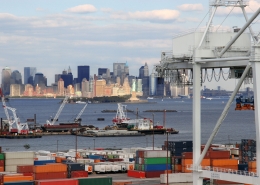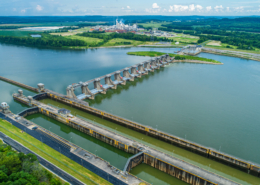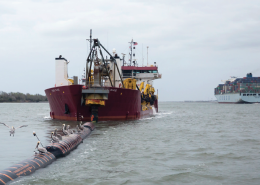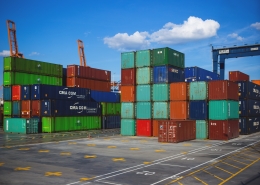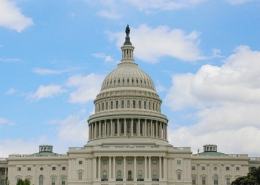On Tuesday, November 7th, Senator Jacky Rosen (D-NV) convened the Senate Subcommittee on Tourism, Trade and Export Promotion to hear invited testimony related to the impact of increased tourism in recent years.
The hearing, titled “Sustainable Tourism for a Thriving Economy,” was largely focused on the impacts – positive and negative – of outdoor recreation and related tourism, highlighting the experiences of smaller and rural communities. The subcommittee heard comments from the panelists below with the overall goal of determining which practices can help build a sustainable travel and tourism economy while protecting natural resources, supporting the tourism economy, and ensuring responsible infrastructure development.
- Julie Regan, Executive Director, Tahoe Regional Planning Agency
- Jean Garris Hand, Global ESG and Head of Sustainability, Hilton
- Amy Allison, Director, Western North Carolina: Made by Mountains Partnership
Increased Outdoor Recreation
With the onset of COVID, many people found themselves looking for activities and vacations which they could do safely, maintaining social distance from others in well-ventilated locations for the sake of personal health. Unsurprisingly, this resulted in increased utilization of outdoor recreation leading to an influx in visits to various hiking and water activity locations and, of course, national parks. The U.S. Department of the Interior reported a record number of national park visits in 2022.
This growth in outdoor recreation has not only impacted parks, but it has also significantly impacted communities surrounding parks and outdoor activity areas. Many National Parks visitors also spent time in these surrounding, or “gateway” communities. In 2022, visitors spent an estimated $23.9B in these gateway regions, generating an estimated 378,400 jobs.
While the overall economic gain is undeniable (national parks as a whole provided an estimated $50.3B in economic output in 2022), gateway and rural communities seeing this rapid influx of visitors have also faced major challenges. The sudden increase in visits has flooded these smaller communities, overwhelming infrastructure and resources. Amongst the panelists for the hearing was Julie Regan who highlighted the experience of Lake Tahoe, sharing that the community has faced issues with littering and illegal campfires in outdoor recreation areas, as well as issues like increased traffic and difficulty maintaining affordable housing spaces for Tahoe residents. Per Regan, the Tahoe area, with a population of around 54,000 sees 15 million visitors annually.
What are Communities Doing to Address Challenges?
Of the entities represented by panelists, each have taken steps toward developing more sustainable practices. The Lake Tahoe region has worked with residents and various public and private stakeholders to create a Destination Stewardship Plan geared toward better managing visitors while building up the local communities and preserving the natural beauty of the region. The Made by Mountains Partnership has worked to increase awareness of the region, improve tourist understanding of outdoor recreation best practices, and connect small and local businesses with grant, investment, and training opportunities. And finally, Hilton has worked to further sustainable operations and encourage small business development. Eighty-seven percent of the hotel chain’s establishments are franchises ranging from large investor to small family ownership. Hilton has also created plans for sustainability focusing on reducing greenhouse gas emissions, energy consumption, and water and overall waste.
Infrastructure, Infrastructure, Infrastructure
Of the issues faced by rural and gateway communities, one of the biggest is maintaining an adequate transportation infrastructure to handle the influx of visitors to their regions. Western North Carolina is a gateway to the Great Smoky Mountains National Park and in 2022, the region saw about 13 million visitors. The local infrastructure is not always equipped to handle these increases which has led to challenges with traffic and pollution as transportation is one of the largest contributors to greenhouse gas emissions.
(Ed. Note: The other gateway to that Park is Pigeon Forge, Tennessee, which had the second-busiest rural mass transit system in the U.S. in 2022, with 2.28 million UPT.)
In response, cities have worked to enhance infrastructure not only focusing on designing mobility solutions in the planning process, but they are also looking for transit and trail opportunities to get visitors out of personal vehicles. Shuttles to park sites have alleviated some congestion, and many locations are looking to build out trail networks, connecting city main streets directly to other hiking and biking trails.
These steps have been helpful, but a challenge within this area is, as always, funding. Regan and Amy Allison, representing the Made by Mountains Partnership, both highlighted funding as a challenge for communities. The need to invest in transit, trails, and technology for the movement of people is imperative, but these regions have at times struggled to acquire funding for projects. Tourism falls under the Department of Commerce; there are opportunities for grants there, but these can at times seem like one size fits all approaches. Smaller communities do not always have the resources to compete at the same level as larger communities in the grant process which can be limiting, and some transportation grants can be difficult to navigate.
Increasing Awareness
Organizations like Made by Mountains across the country have and continue to work diligently on a basic principle of outdoor recreation: educating visitors on appropriate practices. A major issue in recent years has become human impact to natural areas including issues with litter and illegal fires. Made by Mountains has created an awareness campaign which includes themes like “pack it in, pack it out” and “leave no trace,” which essentially encourage visitors to leave nature exactly as it was prior to their visit, taking with them any trash or items with which they came.
Made by Mountains has worked with state tourism and other agencies to encourage the use of the same language across all natural areas in the state in hopes that the uniformity of language will condition visitors. Allison also highlighted that it could be impactful to have a campaign with uniform language across the country, creating a familiarity of these nature best practices.
Local Business Enhancement
In Tahoe and Western North Carolina alike, these organizations and other investors have worked to engage with local businesses. Whether funding opportunities through private and other local investors, or opportunities at the state and federal level, organizations are working to connect local businesses with opportunities.
Jean Garris Hand, representing Hilton and the American Hotel and Lodging Association, also discussed the hotel chain’s franchise opportunities. With opportunities for larger and smaller franchisees, the hotel chain works to provide resources for management, cost effectiveness, and sustainability.
Conservation and Sustainability Practices
In the areas of conservation and sustainability, the focus is on maintaining the beauty of and accessibility to outdoor spaces. Garris Hand detailed Hilton’s efforts in sustainability, highlighting their net zero emissions goal and their waste reduction efforts for food and plastic key cards. The hotel chain has developed programs for food donation and has implemented digital key cards to lower waste. The chain also provides updates to franchise owners related to resource conservation. They are provided updates on use in areas of water and energy with resources for how to reduce any waste they are seeing.
For communities with natural areas, conservation and sustainability has taken on different forms. Regan and Allison both discussed efforts to preserve natural sites and discourage visitors from leaving behind a footprint from their visit. Regan, unfortunately, also mentioned efforts to decrease tourism to the Tahoe area, cutting back on advertising to parts of California and advertising certain areas within the Tahoe region.
Sustainable Tourism
The push for sustainable tourism practices is a very delicate balance between community need, economic health, accessibility to nature, and environmental conservation. National Parks and other outdoor recreation locations are intended for enjoyment and admiration, and they can also be highly beneficial economically for local communities. But it is vital to conserve these nature locations and preserve local communities simultaneously which cannot be done without the engagement of visitors, the community, numerous stakeholders, and various levels of governmental entities.





